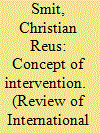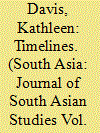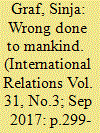|
|
|
Sort Order |
|
|
|
Items / Page
|
|
|
|
|
|
|
| Srl | Item |
| 1 |
ID:
124130


|
|
|
|
|
| Publication |
2013.
|
| Summary/Abstract |
Since the end of the Cold War, the number of books and articles on intervention in world politics has grown dramatically. Yet curiously little of this work subjects the concept of intervention itself to critical scrutiny. Scholars often preface their analyses with definitional discussions about what intervention is, but these definitions take a common form, conceiving intervention within a 'sovereignty frame'. This article questions this conception of intervention, arguing that it distorts our understanding of interventionary practices and forms of reasoning that occurred in non-sovereign international orders. After exploring the sovereignty framing of intervention in greater detail, I advance an alternative conception. International orders are systemic configurations of political authority: they comprise multiple units of such authority, each with its own realm of jurisdiction, organised according to some principle of differentiation. Importantly, this principle need not be territorial: it could be functional, for example. International intervention is the transgression of a unit's realm of jurisdiction, conducted by other units in the system. Unlike the sovereign framing of intervention, this conception is equally applicable to the interventionary ideas and practices of diverse international orders, and provides a better basis on which to understand how thinkers in different historical contexts have reasoned about intervention.
|
|
|
|
|
|
|
|
|
|
|
|
|
|
|
|
| 2 |
ID:
105656


|
|
|
|
|
| Publication |
2011.
|
| Summary/Abstract |
This article explores the account of international hospitality found in the natural law tradition from Vitoria to Kant. Rather than limit itself to intellectual history, the focus here is on a more enduring theme: the double-bind of hospitality which the natural lawyers encountered in seeking to find a place for the welcome of the foreigner in the 'law of nations'. Although these thinkers agreed on a natural right of communication, this proved destabilising, even destructive, of the property claims by which hosts establish their domain as properly theirs in the first place. All struggled with this double-bind, though this took different forms, from the concern that the law of hospitality might thereby justify colonial appropriation to fears for how it could threaten sovereignty. Two thinkers arguably find a way out of the double-bind of right of communication-right of property in hospitality, but sacrifice the law of hospitality in the process: Pufendorf, subordinating communication to property, turns hospitality into charity and thereby effectively denies it status as a law of nature; Kant, putting communication first, makes hospitality a matter of right, not philanthropy, but also sees it as instrumental to the development of a global civil condition, where it would be redundant.
|
|
|
|
|
|
|
|
|
|
|
|
|
|
|
|
| 3 |
ID:
137262


|
|
|
|
|
| Summary/Abstract |
This essay advances an argument regarding the structure of periodisation and the ways in which it limits critique of imperial historiography. It focuses first on the history and structure of medieval/modern periodisation and its relationship to the more recently popular ‘early modern’, and then turns briefly to the historiography of feudalism, an important anchor of the period concept, ‘the Middle Ages’. It then attends in more detail to the historiography of secularisation, particularly the recent tendency to find a secularising impulse in the texts of ‘early modern’ authors such as Vitoria and Grotius, which ultimately reinscribes the imperial logic that Subaltern Studies has worked to critique.
|
|
|
|
|
|
|
|
|
|
|
|
|
|
|
|
| 4 |
ID:
155789


|
|
|
|
|
| Summary/Abstract |
Current debates on ‘crimes against humanity’ address its history and its potentially neo-imperial effects in international relations. In reference to these issues, this essay abstracts the idea of universal crime from the contemporary concept of ‘crimes against humanity’ and analyzes its mobilizations in early-modern perspectives on the legitimacy of European colonialism. First theorizing the easy union between notions of universal crime and arguments about European imperialism, I then draw on arguments by Vitoria, Gentili, and Grotius. I find that they rely on the idea of an offense injuring all mankind to negotiate colonial relationships between European powers and peoples abroad as well as between European powers vis-à-vis one another, both within Europe and in non-European spaces. The essay concludes by offering three venues for inquiry into the concepts of universal crime and crimes against humanity, namely their political productivity, their historical circulation, and their contemporary neo-imperial character.
|
|
|
|
|
|
|
|
|
|
|
|
|
|
|
|
|
|
|
|
|